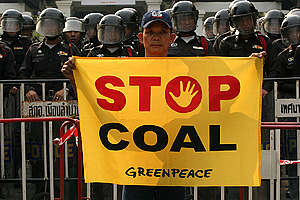
A villager from Mae Moh joins the protest at the heavily guarded entrance of the APEC Clean Coal meeting venue in Lampang province, 600 kms north of Bangkok. People Against Coal, a coalition of communities from Chiang Mai and Lampang and several NGOs like Greenpeace, condemned APEC for promoting coal and demanded support for clean energy. Lampang is site of the Mae Coal Power plant, the largest of its kind in Southeast Asia and has caused deaths, severe health and environmental problems to nearby villages.
Ten years have passed since Greenpeace made the decision to set up a formal presence in Southeast Asia. The choice to expand and operate in the region was motivated by the realization that the battle for the future of the planet will ultimately be won or lost in Asia. If Asian countries, including the fast-growing Southeast Asian economies, were to continue pursuing a development path characterized by an obsession to attain economic growth at all costs, then the world risks seeing a tragic repeat of the ecological nightmares which have plagued decades of mindless industrial growth in the West.
In fact, the climate crisis which now our collective future is mainly a legacy of the over consuming and fossil-fuel based development paradigm pursued and still being fostered by the industrialized countries. No doubt, the responsibility for moving us away from the brink of this impending ecological meltdown rests primarily on the rich countries.
Given the many positive advances in science and technology and the unprecedented awareness and insight on environmental issues nowadays, it is also imperative for developing countries to leapfrog over and learn from the mistakes and excesses of Western industrialization and consumerism unfettered. Otherwise, the alternative would be unthinkable. We would need six planets in the next half century if all of us were to live and develop like Americans or Europeans.
There is already an abundance of examples and initiatives which prove that communities, states and nations can do the right thing for the environment while still being able to provide for the growing needs of their populations. A decade ago, I remember cases in our region involving the blatant and indiscriminate dumping of garbage and hazardous waste coming from the industrialized countries. I was horrified to discover that in their bid to attract all kinds of investments, no matter how dirty, our countries were all so willing to sacrifice environmental, worker and community health in exchange for
short-term gains. In our early years in Southeast Asia, we campaigned heavily against these instances of toxic trade and dirty technology transfer. Judging by the stricter controls now in place against such
abhorrent practices and the fact that such scandals have now become less frequent, we have proven that positive and dramatic changes in this field are not only possible, but often become the acceptable
norm.
These and other positive trends give me the confidence to say ten years from now, we would be seeing a massive leap in the development of clean and energy-efficient systems across the region. Due to the
major problems and increasing liabilities associated with the operation of dirty energy plants like coal and nuclear, our leaders will be able to better appreciate the wisdom and superiority of renewable energy sources. What used to be seen as alternative will someday become main stream.
Rampant deforestation especially in key places like Indonesia would be reversed and damaged ecosystems, including polluted lakes and rivers will be rehabilitated. There will be greater investments to promote sustainable and organic farming as a better and safer option to meet the increasing demand for food.
The rights to clean air, clean water and safe food – essentially the right to live in a healthy and adequate environment – would be respected, observed and guaranteed like all other important civil rights and liberties.
This is the change we envision for Southeast Asia in the next ten years. You can be sure that Greenpeace will be there to play a catalytic role in bringing about this decisive transformation of our societies. We look forward to another decade of enlightened partnership and engagement with you as we continue on this journey to make this world a better place.
Von Hernandez is the Executive Director of Greenpeace Southeast Asia
